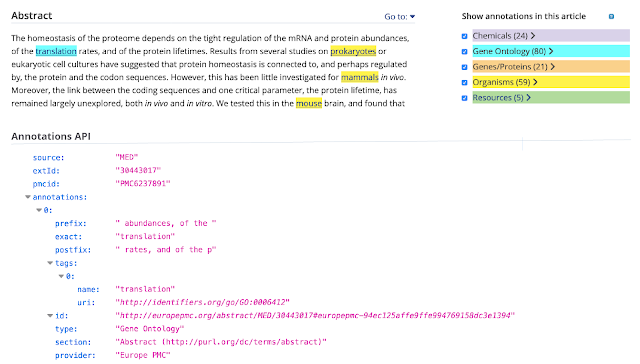**Europe PMC POSI update – 2 years on ** Two years have sailed by since Europe PMC adopted the Principles of Open Scholarly Infrastructure (POSI) in February 2021. POSI is a set of guidelines for open scholarly infrastructure providers and outlines how these organisations should be run and sustained. It offers a framework to uphold transparency and accountability.

[From algorithms to the bench]{style=“color: #666666; font-family: "arial"; font-size: 15pt; vertical-align: baseline; white-space: pre-wrap;”} [Text-mining holds the promise of helping researchers to overcome information overload. It is a familiar premise: an avalanche of scientific knowledge is being produced and shared.
[We are excited to announce the launch of Europe PMC Annotations API, which provides programmatic access to annotations text-mined from biomedical abstracts and open access full text articles. The Annotations API is a part of Europe PMC’s programmatic tools suit and is freely available on the Europe PMC website: ]{style=“font-family: "arial"; font-size: 11pt;

[Manual curation is vital for maintaining quality information in biological databases. However, with the exponential growth in biological data this approach is both challenging and time consuming. We wanted to create a scalable and sustainable process which could complement manual curation. ]{style=“color: #494949; font-family: "open sans" , "helvetica neue" , "helvetica" , "arial" , sans-serif;”}[ ]{style=“color: #494949;
[Evidence Finder (EvF) provides a new way of searching Europe PMC that will help you find the most relevant articles more quickly. By surfacing “facts” based on biological concepts, EvF enhances the Europe PMC search, targeting relevant sentences from within full text articles. Over the next few weeks, we will be running an experiment on the Europe PMC website that will incorporate EvF and explore how it is used.]{style=“background-color: white;

[New copyright exceptions to text and data mining for non-commercial research have recently come into effect and this is welcome news for UK researchers and research, argues ]{style=“font-family: "arial" , sans-serif;
[ ]{style=“font-family: "arial" , "helvetica" , sans-serif;”} []{style=“font-family: "arial" , "helvetica" , sans-serif;”} [There is a new prototype tool available for browsing on Europe PMC labs: Acromine. Developed and hosted by the National Centre for Textmining, University of Manchester, Acromine suggests expansions of acronyms and presents articles specific to those expansions.
UKPMC Labs is a new component of the UKPMC website, which will showcase novel applications based on UKPMC content. The first application to be featured on the Labs website is EvidenceFinder, an application that surfaces “facts” based on a user’s search terms from full text articles. The user is presented with a list of questions based on the search terms.
Text mining features in databases are an increasingly popular way to extract useful information that could otherwise remain hidden. A new resource has become available to allow researchers to search for particular chemical compounds in biomedical literature. This task is often confounded by multiple names for particular chemicals being used in publications.